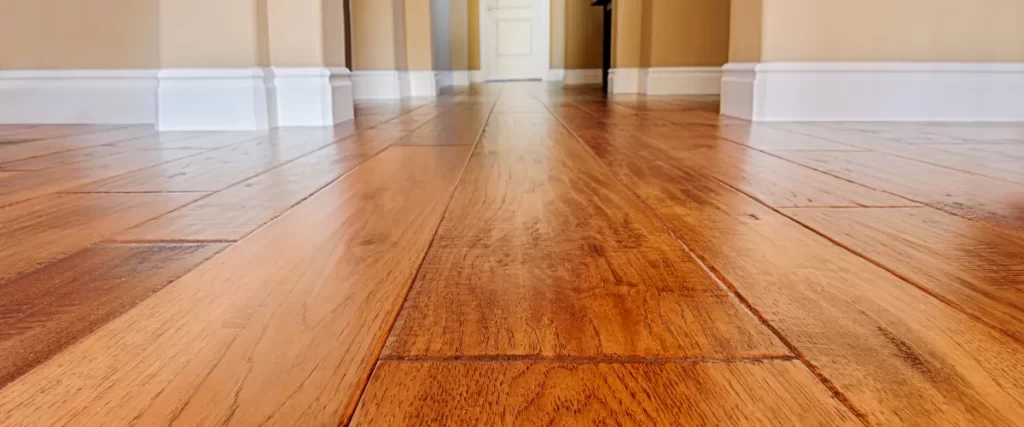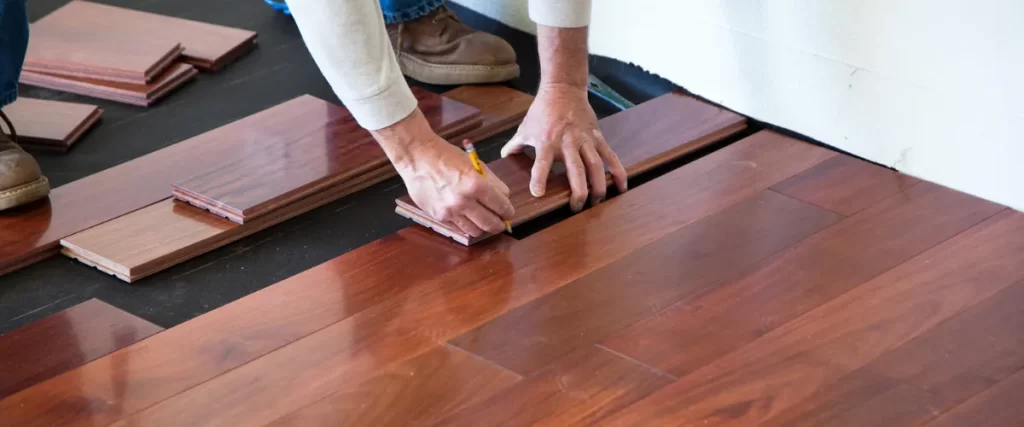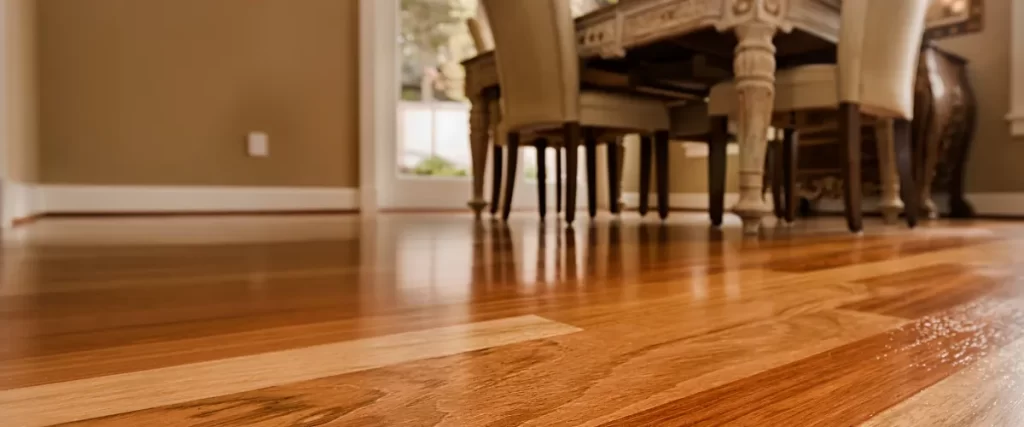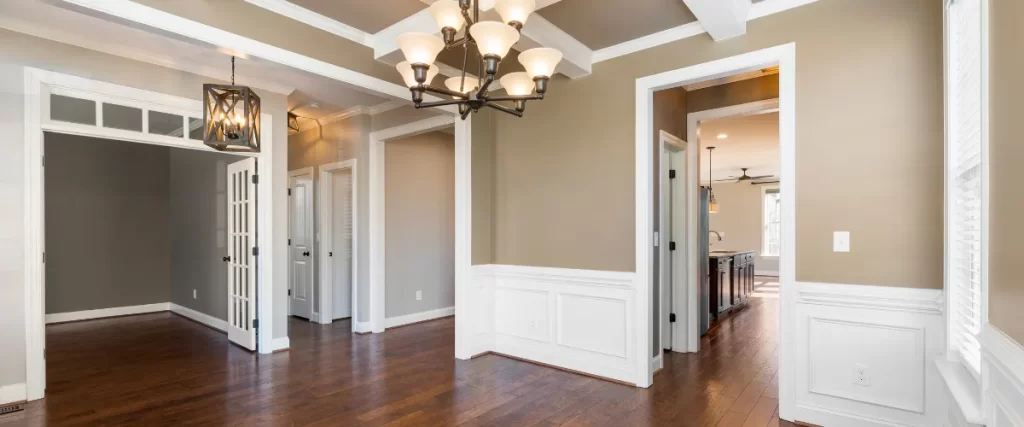Georgia’s warm and humid climate can be both a blessing and a challenge for homeowners. While the lush landscapes and mild winters create a pleasant environment, the persistent humidity poses significant risks to hardwood floors.
In cities like Roswell and Alpharetta, where humidity levels remain high for much of the year, warping, cupping, and other forms of damage can shorten the lifespan of your hardwood floors.
In this comprehensive guide, we’ll explore how Georgia’s humidity affects hardwood flooring, why these issues occur, and what practical steps you can take to protect your floors and maintain their beauty.

Understanding the Impact of Humidity on Hardwood Floors
Hardwood floors are prized for their natural beauty, durability, and timeless appeal. However, wood is a natural material that responds to its environment. In areas with high humidity, such as much of Georgia, hardwood floors are vulnerable to moisture-related issues that can cause them to warp, cup, or even crack.
How Humidity Affects Wood
- Moisture Absorption:
Hardwood floors naturally absorb and release moisture in response to the humidity in the air. In high-humidity conditions, the wood absorbs more moisture, causing it to swell. Conversely, during drier periods, it loses moisture and shrinks. - Warping and Cupping:
When wood swells unevenly—often due to inconsistent moisture levels—it can begin to warp or cup. This means the edges of the planks may rise higher than the center, or vice versa, resulting in an uneven, unsightly floor. - Expansion and Contraction:
Repeated cycles of expansion in humid weather and contraction in drier conditions lead to internal stresses within the wood. Over time, these stresses can cause cracks or splits, damaging both the floor’s appearance and structural integrity.
Understanding these processes is key to preventing damage. When you know how humidity affects your hardwood floors, you can implement strategies to minimize its impact.
Factors Contributing to Humidity-Related Damage
Several factors amplify the effect of Georgia’s humidity on hardwood floors in Roswell and Alpharetta homes:
Environmental and Seasonal Influences
- Year-Round Humidity:
Georgia experiences high humidity levels throughout the year, especially during the summer months. This persistent moisture creates a challenging environment for hardwood floors. - Seasonal Fluctuations:
Although winters in Georgia are milder than in many northern states, seasonal transitions can still cause fluctuations in indoor humidity. Rapid changes between humid summers and relatively drier winters can accelerate the natural expansion and contraction of wood.
Indoor Factors
- Poor Ventilation:
Kitchens, bathrooms, and other high-moisture areas that are not properly ventilated contribute to elevated indoor humidity levels. Without adequate ventilation, moisture accumulates and affects the floors. - Water Spills and Leaks:
Routine accidents, such as spills or leaks from plumbing fixtures, can increase the local moisture around hardwood floors if not addressed promptly. - Subfloor Conditions:
The subfloor plays a critical role in regulating moisture. Poorly insulated or inadequately sealed subfloors allow moisture to seep into hardwood flooring, leading to damage over time.

Preventative Strategies for Protecting Hardwood Floors
Preventing warping and other moisture-related issues requires a multi-pronged approach. Here are several effective strategies to help protect your hardwood floors in Roswell and Alpharetta:
1. Maintain Proper Indoor Humidity
Keeping indoor humidity levels stable is one of the most effective ways to prevent hardwood floor damage.
- Use a Humidistat:
Invest in a humidistat to monitor indoor humidity. Aim to maintain levels between 30% and 50% to minimize wood expansion and contraction. - Deploy Dehumidifiers:
In areas with persistently high humidity, use portable or whole-house dehumidifiers to remove excess moisture from the air. - Control Moisture Sources:
Ensure that bathrooms, kitchens, and laundry rooms have proper exhaust fans. Regularly inspect these areas for leaks and fix them promptly.
2. Enhance Ventilation Throughout the Home
Proper air circulation prevents moisture from settling on hardwood floors.
- Install Exhaust Fans:
High-quality exhaust fans in high-moisture areas help expel humid air. - Open Windows Strategically:
When weather permits, opening windows can help improve airflow and balance indoor humidity levels. - Use Air Purifiers:
Some air purifiers come with built-in dehumidifying functions that further help in maintaining a balanced indoor environment.
3. Upgrade Flooring Materials and Finishes
Choosing the right materials and finishes can mitigate the effects of humidity.
- Engineered Hardwood:
Consider engineered hardwood floors, which are designed to be more stable in fluctuating moisture conditions compared to solid hardwood. - Quality Finishes:
Apply high-quality sealants and finishes that provide a barrier against moisture. Regular reapplication of these finishes can help protect the wood. - Underlayment Solutions:
Use moisture-resistant underlayment during installation to provide an extra layer of protection between the subfloor and the hardwood.
4. Implement Routine Maintenance and Inspections
Regular care can catch early signs of damage before they become serious problems.
- Regular Cleaning:
Keep floors clean to remove dust and contaminants that may hold moisture. Use cleaning products designed for hardwood floors. - Frequent Inspections:
Periodically inspect your floors for signs of warping, cupping, or moisture damage. Early detection allows for prompt repairs. - Professional Maintenance:
Consider annual inspections by a flooring professional who can offer advice on preserving your hardwood floors.

Strategies to Prevent Hardwood Floor Damage from Humidity
| Strategy | Action Steps | Benefits |
| Maintain Proper Humidity | Use humidistats, dehumidifiers, and control moisture sources in high-use areas. | Reduces expansion/contraction cycles; prevents warping. |
| Enhance Ventilation | Install exhaust fans, open windows, use air purifiers. | Improves airflow; lowers indoor humidity. |
| Upgrade Materials | Consider engineered hardwood and high-quality finishes. | Increases stability; enhances moisture resistance. |
| Routine Maintenance | Regular cleaning, inspections, and professional check-ups. | Early detection of issues; long-term protection. |
Additional Tips for Redmond and Alpharetta Homeowners
For homeowners in Roswell, Alpharetta, and surrounding areas, consider these extra measures to further protect your hardwood floors:
- Use Rugs and Mats:
Place rugs in high-traffic areas and near entryways to absorb moisture and reduce wear on the floor surface. - Control Indoor Temperature:
A consistent indoor temperature minimizes rapid changes in humidity, reducing the stress on hardwood floors. - Avoid Excess Water:
Wipe up spills immediately and avoid using excessive water when cleaning hardwood floors. Use damp—not wet—mops. - Invest in Quality Subflooring:
Ensure that the subfloor is properly insulated and sealed to prevent moisture from seeping upward into the hardwood. - Consider Professional Consultation:
If you’re planning a new installation or renovation, consult with a flooring expert who can provide tailored advice based on your specific climate and home conditions.
Frequently Asked Questions
Q: What humidity level is ideal for hardwood floors?
A: Ideally, indoor humidity should be kept between 30% and 50% to minimize expansion and contraction of hardwood floors.
Q: How often should I inspect my hardwood floors for moisture damage?
A: It’s recommended to inspect your floors at least quarterly, with more frequent checks during seasonal changes.
Q: Can I use solid hardwood in high-humidity areas?
A: While solid hardwood can be used, engineered hardwood is typically more stable in environments with high humidity due to its layered construction.
Q: How do dehumidifiers help protect hardwood floors?
A: Dehumidifiers reduce excess moisture in the air, which helps prevent wood from swelling, warping, or contracting excessively.
Q: Are there specific finishes that better protect against moisture?
A: Yes, high-quality polyurethane or moisture-resistant sealants provide a strong barrier against water infiltration.
Q: What is the best way to clean hardwood floors in a humid climate?
A: Use a damp mop with a cleaner designed for hardwood floors—avoid excessive water to prevent moisture damage.
Q: Should I consider professional maintenance for my hardwood floors?
A: Regular professional inspections can help catch issues early and ensure that your floors are well-maintained for long-term durability.

Top Manufacturers of Hardwood Flooring
When choosing hardwood flooring, selecting a reputable manufacturer ensures quality, durability, and a wide range of design options.
- Bruce Hardwood Flooring: Known for versatile options and high-quality finishes that suit both modern and traditional interiors.
- Mohawk Industries: Offers innovative hardwood solutions with sustainable sourcing and advanced scratch-resistant technologies for lasting performance.
- Shaw Floors: Balances style and functionality with a variety of hardwood collections crafted for resilience and elegance.
- Armstrong Flooring: Provides durable and affordable hardwood flooring, designed to handle everyday wear and tear seamlessly.
- Mannington Mills: Renowned for eco-friendly products and unique design choices that cater to diverse home decor preferences.
Why Choose Our Expert Team?
Our team has been delivering professional hardwood flooring services for years. Trust the best to ensure exceptional results and long-term savings. Contact us at to kickstart your hardwood floor installation today!
